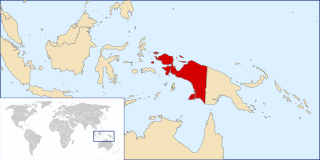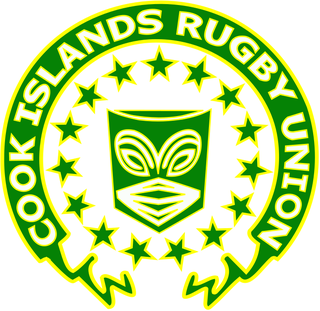Sheath, pronounced, may refer to:

A codpiece is a triangular piece that attached to the front of men's hose, covering the fly. It may be held in place by ties or buttons. It was an important fashion item of European clothing during the 15th–16th centuries, in the 16th century becoming a firm upwards-pointing projection based on a stiff material such as boiled leather, or in plate armour, steel.

The Dani are an ethnic group from the Central Highlands of Western New Guinea in Baliem Valley, Highland Papua, Indonesia. Around 100,000 people live in the Baliem Valley, consisting of representatives of the Dani tribes in the lower and upper parts of the valley each 20,000 and 50,000 in the middle part. The areas west of the Baliem Valley are inhabited by approx 180,000, representatives of the Lani people, incorrectly called "Western Dani". All inhabitants of Baliem Valley and the surrounding areas are often called Dani hence they are also sometimes conflated with other highland tribes such as Lani in the west; Walak in the north; Nduga, Mek, and Yali in the south and east.

The indigenous peoples of Western New Guinea in Indonesia and Papua New Guinea, commonly called Papuans, are Melanesians. There is genetic evidence for two major historical lineages in New Guinea and neighboring islands: a first wave from the Malay Archipelago perhaps 50,000 years ago when New Guinea and Australia were a single landmass called Sahul and, much later, a wave of Austronesian people from the north who introduced Austronesian languages and pigs about 3,500 years ago. They also left a small but significant genetic trace in many coastal Papuan peoples.

Western New Guinea, also known as Papua, Indonesian New Guinea, and Indonesian Papua, is the western half of the island of New Guinea, formerly Dutch and granted to Indonesia in 1962. Given the island is alternatively named Papua, the region is also called West Papua.

The koteka, also referred to as a horim or penis gourd, is a penis sheath traditionally worn by native male inhabitants of some ethnic groups in New Guinea to cover their penises. The koteka is normally made from a dried-out gourd, Lagenaria siceraria, although unrelated species such as pitcher-plant are also used. The koteka is held in place by a small loop of fiber attached to the base of the koteka and placed around the scrotum. A secondary loop placed around the chest or abdomen is attached to the main body of the koteka.

A kynodesmē was a cord or string or sometimes a leather strip that was worn primarily by athletes in Ancient Greece and Etruria to prevent the exposure of the glans penis in public and to restrict untethered movement of the penis during sporting competition. It was tied tightly around the akroposthion, the most distal, tubular portion of the foreskin that extends beyond the glans. As depicted in Ancient Greek art the kynodesme was worn by some athletes, actors, poets, symposiasts and komasts. It was worn temporarily while in public and could be taken off and put back on at will. The remaining length of cord could either be attached to a waist band to pull the penis upward and expose the scrotum, or tied around the base of the penis and scrotum so that the penis appeared to curl upwards.

The Cook Islands is a third tier rugby union playing nation. They began playing international rugby in early 1971. Thus far, the Cook Islands have not made an appearance at any of the World Cups.

The Chimbu–Wahgi languages are a language family of New Guinea. They are sometimes included in the Trans–New Guinea proposal; Usher links them with the Engan languages in a Central New Guinea Highlands family.

The Finisterre–Huon languages comprise the largest family within the Trans–New Guinea languages (TNG) in the classification of Malcolm Ross. They were part of the original TNG proposal, and William A. Foley considers their TNG identity to be established. The languages share a small closed class of verbs taking pronominal object prefixes some of which are cognate, strong morphological evidence that they are related.

Yali are a major tribal group in Highland Papua, Indonesia, and live to the east of the Baliem Valley, mainly in Yalimo Regency, Yahukimo Regency, and the surrounding regions.
The Koteka Tribal Assembly is a cultural organisation of the Koteka-wearing tribes of the then Papua province region in Indonesia. It was established in January 2000 as an outcome of discussions among the elders of several tribes in the highlands of the region. The main goal of the assembly is to peacefully, democratically and legally work towards the recognition and protection of customary laws, values and beliefs of the Koteka peoples. Many activists from the organization who were involved in peaceful protests have been tortured and forced into exile.

Ochyrotica is a genus of moths in the family Pterophoridae and only genus in the Ochyroticinae subfamily. Ochyrotica was described by Lord Walsingham in 1891 and the subfamily Ochyroticinae was described by Lutz Thilo Wasserthal in 1970.
Mwatebu is an Austronesian language spoken in a single village in the D'Entrecasteaux Islands of Papua New Guinea. It is spoken in the single village of Mwatebu in Duau Rural LLG, Milne Bay Province.
Tohoa Tauroa "Paul" Koteka is a former New Zealand rugby union player. A prop, Koteka represented Waikato at a provincial level, and was a member of the New Zealand national side, the All Blacks, in 1981 and 1982. He played six matches for the All Blacks including two internationals. After moving to Perth, he represented Western Australia, and became captain of the team.

Kane Koteka is an Australian rugby union player who currently plays for the Western Force in the international Super Rugby competition and the Perth Spirit in the National Rugby Championship. His regular playing position is as a loose forward.
Penis sheath may refer to:

Izaac Hindom was an Indonesian bureaucrat and politician who served as the governor of Irian Jaya from 1982 until 1988.

Central Papua, officially the Central Papua Province is an Indonesian province located in the central region of Western New Guinea. It was formally established on 11 November 2022 from the former eight western regencies of the province of Papua. It covers an area of 61,072.91 km2 and had an officially estimated population of 1,452,810 in mid 2023. It is bordered by the Indonesian provinces of West Papua to the west, the province of Papua to the north and northeast, by Highland Papua to the east, and by South Papua to the southeast. The administrative capital is located in Wanggar District in Nabire Regency, although Timika is a larger town.

Highland Papua is a province of Indonesia, which roughly follows the borders of Papuan customary region of Lano-Pago, shortened to La Pago. It covers an area of 51,213.33 km2 (19,773.58 sq mi) and had a population of 1,448,360 according to the official estimates as at mid 2023.














